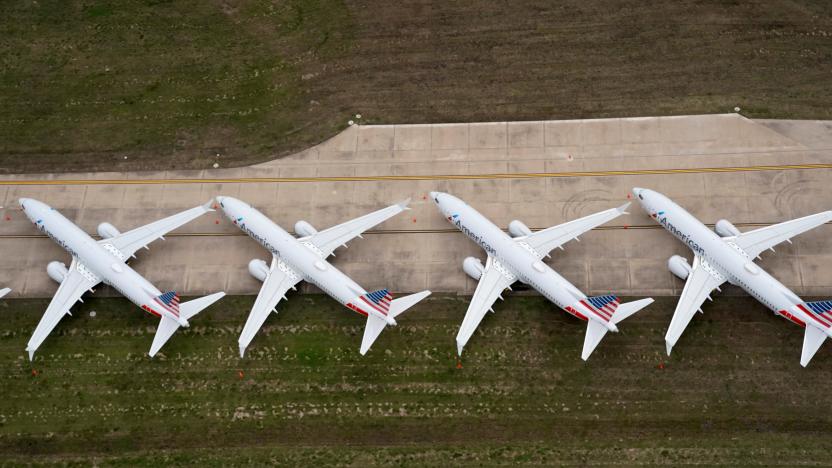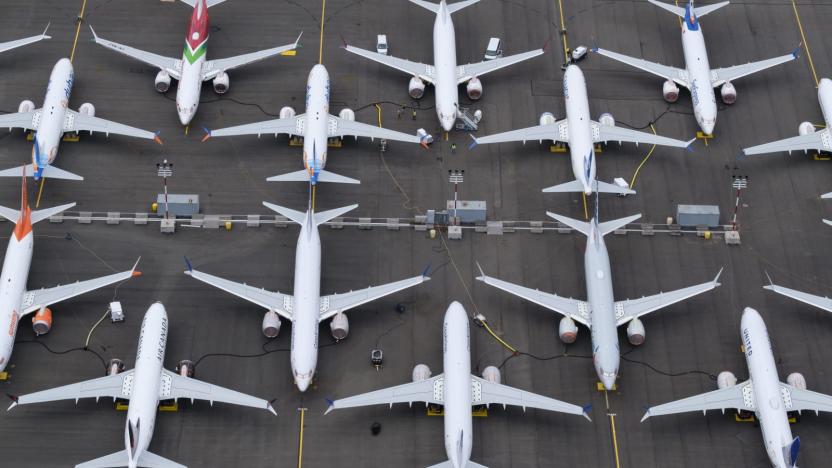EASA
Latest

Europe's aviation safety agency is planning an eco ranking for flights
The EU's Aviation Safety Agency (EASA) plans to create eco-ranking labels labels for the airline industry.

EU regulator says Boeing 737 Max is safe to fly
A software-based safety upgrade may not be ready for another two years, however.

European regulators demand changes to 737 Max autopilot
It's not just American officials who think Boeing's 737 Max software needs more polish. A Bloomberg source said that the European Union Aviation Safety Agency (EASA) has told Boeing to make five changes to the airliner before it can return to service. They're mostly consistent with the FAA's requests, including improvements to the angle of attack sensors, training, manual trim controls and a software flaw linked to a lagging chip. However, the EU regulators also want Boeing to address a previously unmentioned issue with the autopilot failing to switch off in some emergencies -- it might not give pilots enough time to prevent a stall.

Bid adieu to 'Airplane Mode' on European airlines
Want to continue that scintillating game of Words with Friends throughout the entire flight? Well, that might soon be a possibility if you're flying in European airspace. Late last year, the European Aviation Safety Agency (EASA) had decided to permit personal electronics like smartphones and tablets to remain on during takeoff and landing as long as it was in "Airplane Mode." Now, even that restriction has been lifted. Yep, the EASA has deemed "Airplane Mode" no longer necessary, thus allowing for true "gate-to-gate" electronics use. Of course, even if the EASA permits it, each airline will still have to take an assessment test to make sure it won't negatively affect aircraft communications. Turning off Airplane Mode is still a no-no for US flights, though most airlines do let you use your gadgets during takeoff and landing thanks to last year's FAA ruling. Maybe if Airplane Mode becomes unnecessary some day, we'll rename it to something that makes more sense, like "The Mode that Doesn't Suck Up All Your Battery." [Image credit: pouwerkerk/Flickr]

Europe to allow gate-to-gate electronics use by the end of November
Certain air travelers in Europe will soon be free to use smartphones, tablets, e-readers and music players during all phases of flight. An announcement today from the European Aviation Safety Agency (EASA) states that the organization will extend new guidelines by the end of this month, enabling the use of such devices during taxi, takeoff and landing as long as they're switched to "airplane mode," when applicable. Laptops must be stowed during those periods, just as they're required to be in the US. Curiously, the policy will specifically apply to European airlines -- it's not clear if carriers based overseas will be permitted to allow electronics' use while operating within Europe. The EASA also stated that it's researching methods for certifying phones for voice-call use, though we don't expect to see a ruling there for quite some time. Phone calls remain banned on US carriers, even though services like Gogo's Text & Talk utilize FAA-approved technologies.

Airbus gets Euro approval for in-flight calling system
The FAA's still hemming and hawing over how to handle the rather controversial issue of in-flight mobile phone use, but that hasn't stopped Europe's Airbus from pushing the issue on its home turf. Having already signed agreements with Ryanair and Qantas to provide service through its OnAir subsidiary, the company's been testing equipment to enable the use of GSM handsets for some time; the European Aviation Safety Agency's apparently pretty satisfied with how those tests have been coming along, too, having just blessed the system for commercial use. European travelers worried that this development is going to lead to a rash of incessant yappers on domestic flights can take some solace in the knowledge that flight attendants will be able to "manage" the service, even shutting off voice entirely while leaving SMS and data active. Look for OnAir service to drop initially on short flights in Western Europe, though Airbus intends to take it global -- if the FAA's cool with it, anyway.[Via WirelessInfo.com]




